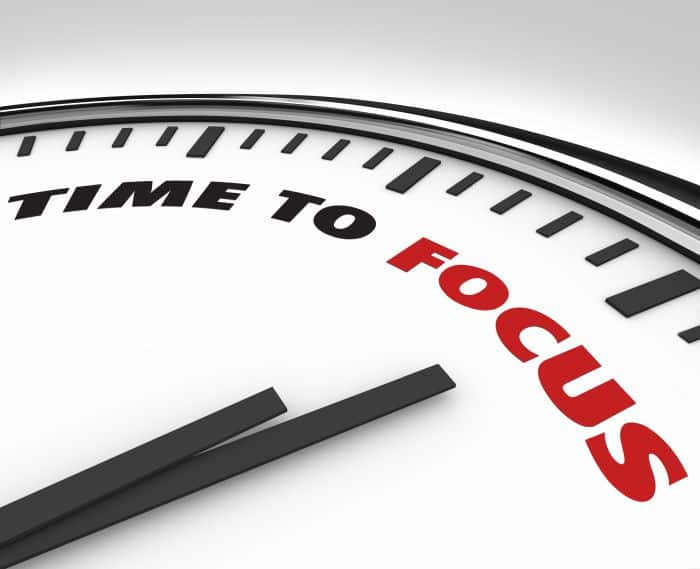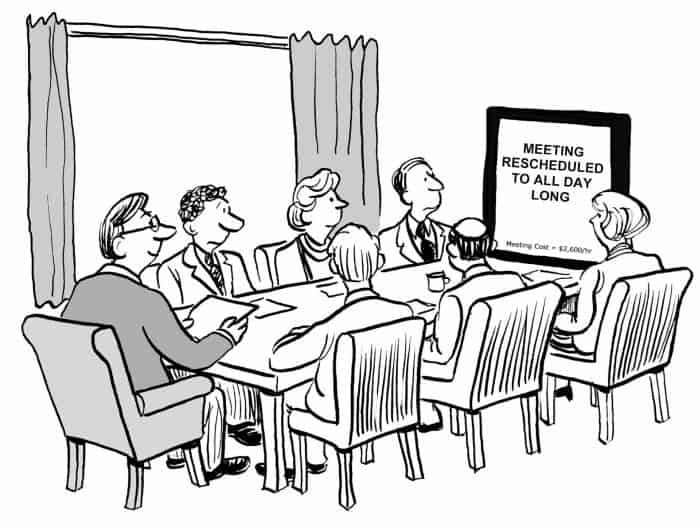How do some people get things done? Focus Time. They focus on their work and don’t let other things distract them.
Have you ever noticed that many drafters and programmers in companies wear noise cancelling headphones for part (or all) of the day. They were blocking out distractions so they could focus on their work.
That focus is critical to getting things done. Wearing headphones all day may not work or be practical for many roles, but you can achieve this focus by dedicating blocks of focus time each day or each week. This will help you avoid distractions and get things done.
Problem: You Don’t Get Time to Focus on Important Work
Do you have difficulty getting things done because you don’t have time to focus?
Not getting work done can be caused by not dedicating concentrated time to focus on your work.
Lack of focus can lead to inefficiency, tiredness, poor job performance, being late with delivering your work and lots of other problems.
Distractions / Interruptions
This lack of focus is often caused by distractions and interruptions. Emails, phone calls, instant messages, social media, in person interruptions, even a noisy work environment. In many cases, your lack of focus is basically caused by lots of interruptions.
Some of the links on this website may be affiliate links to products I use, have tested or am familiar with. I may receive a commission if you click on some of those links and make a purchase. This is at no additional cost to you.
A study by Michigan State University showed that even small interruptions cause increased errors because people have to shift their focus. And a study at George Mason University showed that interruptions increase the time taken to complete tasks and reduce their quality, even allowing for extra time spent during the distraction.
These interruptions stop you focusing on your work. They wear you down, slow you down, and reduce your efficiency.
Too many interruptions increases your stress and frustration. They increase the time it takes to complete your work, leading to a higher effort to accomplish tasks and higher workload overall. They also result in more errors.
Many people find it takes 20 to 30 minutes to get focused on something serious. Every distraction can reset that, so with many distractions during the day you may never get any focus time.
Interruptions stop you getting work done. They stop you from ever getting “in the zone”.
Solution: Remove Distractions by Creating Focus Time
A simple solution to this lack of focus, usually caused by constant interruptions, is to create a specific time each day or each week for focus time.
I have seen many people do this very successfully, especially senior managers whose time is so valuable.
How to Get Focus Time
Set a block of time in your calendar in which you will focus on important tasks. This would preferably be a time each day, possibly the same time each day. At the very least, some blocks of time each week.
I like a minimum of blocks of two hours, four is even better for a big task.
Perhaps a two hour block each day at the same time each day, and one four hour block each week. You should probably try to schedule these blocks of time for when you are most productive. For many people this is the morning. I have met some people who swear their most productive time is near the end of the day (I don’t get it, that is when I am most worn out and losing concentration, but I guess everyone is different).
As a project manager I understand that this is not always possible, important meetings will arise that conflict with your blocked out focus time. When that happens, you can move your focus time. However, by having the regular blocks of time blocked out in your calendar, you will discourage being invited to unimportant meetings, or small or one on one meetings will be scheduled for times when you are listed as available.
I also recognise that some of you will often have meetings taking up nearly your whole calendar, making blocks of focus time nearly impossible to get.
Two solutions that I use are:
Block out focus time far ahead (preferred method):
- Most of us won’t have many meetings booked months in advance. So start setting up your focus time blocks now for whenever there are few meetings booked. Perhaps that is a few weeks from now and onwards. That way people will have to find other times to book meetings with you.
Block out early hours:
- Start work early and block out two hours before most people start work.
- I find that in many companies, few people start work before 8am. You can block out 2 hours of focus time between 6am and 8am to get lots of critical focus time before most meetings will start. I know this is not ideal, but I see many busy senior managers do this. This is what I do, in addition to setting blocks of time far ahead for normal work hours.
- I know this won’t work in most construction industries, where work often starts at 6am. Your alternative then is to get your focus time after most people finish (often after 3pm). I did that for a few years when I was a site based project manager.
Many people find that very short breaks during that multiple hour block of time can help. You can set a 30 minute timer, then have a short break, perhaps a brief walk around the office and stretch. Make sure to not let things distract you at that time. Don’t move on to other tasks, check your email, use social media etc.
How to Maintain Your Focus During Your Blocks of Time
- Don’t answer the phone in your focused work time. Let calls go to voicemail and return them later (best to turn the phone to silent as well).
- Change the message on your phone to suit the situation (e.g. in a meeting, busy etc).
- Turn off or minimise your email software so that you don’t even see it.
- Turn off all possible social media (you really shouldn’t be using that at all during work hours anyway, unless that is part of your job).
- Set your internal messaging system to “Do Not Disturb”. Most systems such as Microsoft Teams have this function and are very easy to switch on and off as needed. I find that most staff will respect that notice and not call or disturb you, unless it is critical. These messages will often link to your email, so if an internal staff member starts typing an email to you they will see a message that you are busy now.
- Control your in-person interruptions. Ideally close your office door and let people know your policy that if the door is closed do not disturb you unless urgent. Have that same time each day and week that you are not available because you are focusing and post this time on your door (also with a “Do Not Disturb” sign).
- If you don’t have a door (such as in an open plan office), when people interrupt you, say “I am busy doing this at the moment, can you send me an email and I will get back to you when I finish”. Even better, make a small sign (in a bright colour so people see it) and put that on your partition or edge of your desk (Amazon and similar companies have plenty of these for sale). People will see that and come back to you later.
- Wear a set of noise cancelling headphones while in your focus time. This will block most noise for you (especially those noisy conversations or phone calls nearby), but is also a clear indication to those around you that you are busy and not to be disturbed.
- Another option, if it is available, is to go to a quiet room in your company and do your focus work there. Many companies have “quiet” rooms. Small one person rooms that are well insulated from sound. If they have a desk, chair, and screen, you can take your laptop and plug it in and start work immediately. You will find very few people will try to disturb you there, you may even find one that most people in your team don’t walk past much, so you can get away from all possible distractions. Just make sure your calendar or message system shows that time as blocked out and shows “do not disturb”, otherwise people may think you are just often out for long lunches.
Get Your Team Focused
If you are managing a team, or managing a project with a dedicated team of people, you may find that you can get great productivity for your team if you set a focus time for everyone.
You could set a two hour block meeting a few times a week as a group “focus time”. That stops other people booking meetings at that time for you all, and you can all get a time to focus on your work. Set this as a recurring meeting and you may discover that your team or project gets a great positive impact.
Lesson: Focus Time Helps You Get Work Done
Your time is important. Yet you are so busy. There are constant distractions, causing your focus to constantly shift. This leads you to not getting much work done.
Set blocks of time each day and/or each week in which you focus on specific work. Turn off and block all distractions in these blocks of time. Don’t let anything disturb you unless it is extremely important.
Setting these blocks of time will help you get lots more work done, leading to better outcomes for you and your projects.


